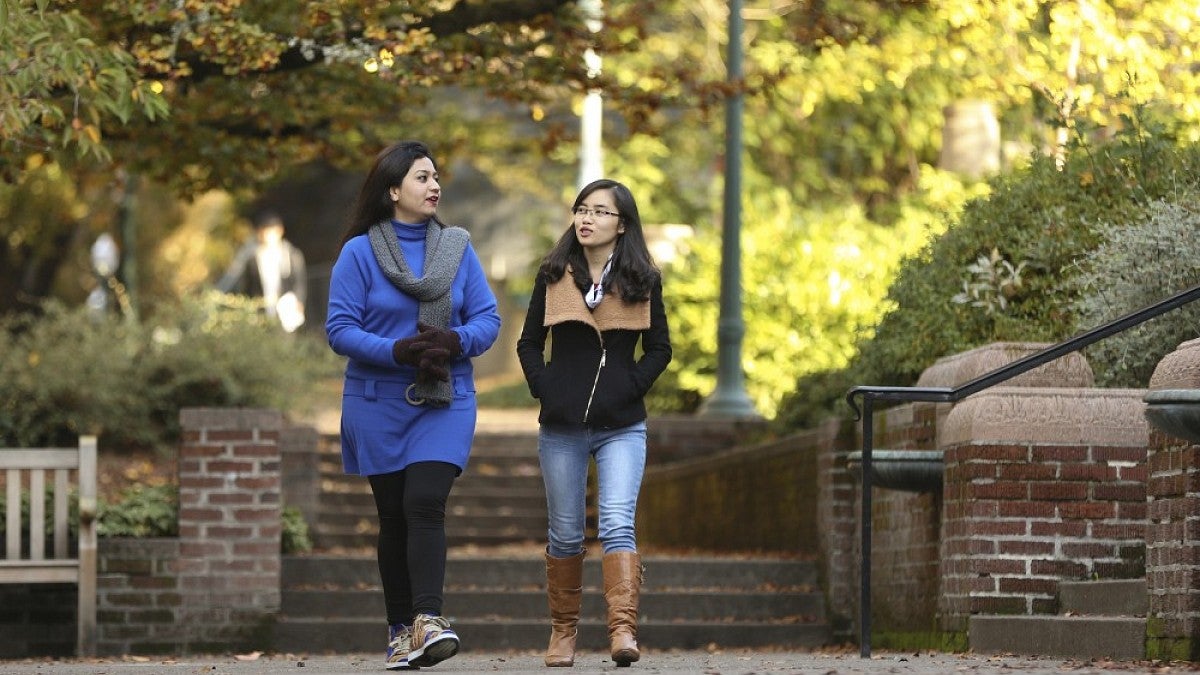Traveling across the world to share knowledge in a foreign place is an impressive undertaking.
The road is perhaps a bit easier with highly valued Fulbright scholarships, but University of Oregon foreign language teaching assistants Tooba Ahmed and Thanh Nguyen nonetheless moved away from family, friends and colleagues to come to Eugene, a place where very few people speak their native languages.
However, they might soon be hearing the familiar sounds of their native tongues — Hindi-Urdu for Ahmed and Vietnamese for Nguyen — around campus: They’re here to teach them to UO students throughout the 2015-16 academic year.
Ahmed and Nguyen are teaching classes as part of the UO Yamada Language Center’s Self Study Language Program, where students and community members can take not-for-credit language classes at their own pace with weekly tutor-mediated sessions to help them with their studies.
“Teaching here has been such a nice experience,” said Ahmed, who’s also an English teacher at COMSATS Institute of Information Technology in Lahore, Pakistan. “By teaching my native language, I’m actually understanding so much about my culture. It’s such a great feeling because my language is my identity, and when I come to know that there are a lot of people who want to learn how to speak Urdu, it feels great.”
Since 1997 the Self Study Language Program has been a university staple for students interested and motivated to learn less-common languages. Foreign language teaching assistants, here on Fulbrights, have almost always been a major component of the program.
“Students get to study with a native speaker and they get to study with someone who isn’t that much older than them,” said Jeff Magoto, the director of the Yamada Language Center. “The whole program is designed to make friends, to build a community and to celebrate it.”
While Ahmed and Nguyen are at the UO they will also participate in the university’s International Cultural Service Program, which provides financial awards to international students who each year put in 80 hours of community outreach. Students are invited to give public presentations and engage with the Eugene and Springfield communities — mostly schools and other civic groups — to talk about their native culture and languages.
“We can’t separate the country from its language,” Nguyen said. “I want everyone to have a better understanding about Vietnam and Vietnamese people.”
Typically, foreign language teaching assistants teach about four hours a week, hold office hours on campus, work on other academic materials related to their studies — both Ahmed and Nguyen are taking linguistics and American culture classes — and complete their community outreach hours over the course of the academic year.
“My students are not taking this for credit, so they really just need and want to learn; one of them has to learn Vietnamese for his job and another is married to someone from Vietnam and wants to communicate with her in-laws,” Nguyen said. “I’m really happy to make contributions to people’s lives like that.”
Although it didn’t take long for Ahmed and Nguyen to find a welcoming community at the UO, both women said culture shock made their first days stateside lonely. Ahmed especially noted the difference between the family-oriented, sharing culture of Pakistan and the go-it-alone style of young Americans; this is the first time in her life that she has ever lived by herself.
“The first 15 days alone in my apartment were depressing; I just wanted to go back home and see my family and friends,” she said. “But I really learned a lot about myself during that time; I feel much stronger as a person than before because of having these experiences. That’s been the biggest change for me.”
Nguyen echoed that sentiment.
“I teach English back in Vietnam and I like to teach some aspects of American culture as well,” she said. “But experiencing this culture is very, very different than teaching about it.”
In the true nature of cultural and academic exchange, Ahmed and Nguyen already have picked up some useful knowledge from their experience teaching and being a part of the UO community they can translate to their lives as teachers in Pakistan and Vietnam.
“I want to gather all the positive qualities of America and apply that back home,” Ahmed said. “What I’m learning from the University of Oregon is how to cooperate with each other, how to support each other academically. I’m learning it in a much better way here because it’s such a different culture.”
— By Nathaniel Brown, Public Affairs Communications


